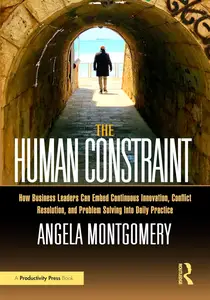
Free Download The Human Constraint: How Business Leaders Can Embed Continuous Innovation, Conflict Resolution, and Problem Solving into Daily Practice
by Angela Montgomery, PhD
English | 2024 | ISBN: 1032644265 | 283 pages | True PDF | 17.56 MB
The Human Constraint is a business novel inspired by over 25 years of work in the field with a methodology that combines Deming’s management philosophy and the Theory of Constraints to equip leaders with the knowledge, method, and tools to manage complex challenges and continuous innovation. In our increasingly complex, interdependent world, leaders and managers are looking for new solutions. As leaders and as individuals, the challenge is to learn to think and act in a way that is effective for our complex times. When we do so, we can avoid being artificially limited by obsolete mental models and we can learn how to avoid unintended consequences that can quickly emerge from an inability to think-plan-act adequately and in a win-win way. The story unfolds during the financial crisis that follows 2008 and how this affects a group of executives engaged in a transformation process. It charts their attempts through the crisis to transform part of an industry dominated by a zero-sum game mentality using an approach based on an ethical and value-based supply chain where all stakeholders benefit. Each chapter is accompanied by a Knowledge Base of systemic Thinking Processes from the Theory of Constraints. This provides additional resources for those readers who want to learn more about a method for joined-up, systemic thinking. The Thinking Processes from the Theory of Constraints provide a full set of solutions for a change process, from the correct identification of what needs to be changed through to designing practical steps for a robust and negative-implication-free implementation. Through the narrative, readers are exposed to a systemic way of thinking about problems and solutions. The supplementary material provides examples of the Thinking Processes from the Theory of Constraints that allow people to develop the skills to: * Understand and analyze our current reality, as individuals and organizations. * Surface assumptions that keep us trapped in less-than-desirable situations. * Generate robust solutions/innovations. * Identify unintended consequences of what may seem like an effective idea.
